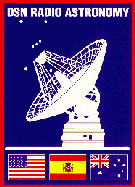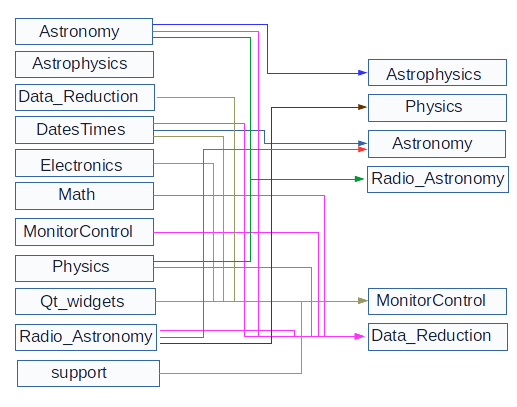
Single Dish¶
Radio Astronomy Software Tools¶
Radio Astronomy Software Tools is a collection of software packages <https://github.com/SDRAST/> that have proven useful in doing radio astronomy with NASA’s Deep Space Network.
The two main activities in radio astronomy (besides building equipment) are
monitor and control of data acquisition (observing), and data reduction.
Consequently the two largest packages in this collection are Data_Reduction
and MonitorControl.
The monitor and control system is overlaid on the existing monitor and
control (e.g. antenna controller, receiver control, etc.) to provide features
necessary or useful for conducting radio astronomy research. The collection
may provide a quick way to start a small single dish radio astronomy
ab initio because it is able to manage a telescope system in which all
subsystems have their own, network-accessible controllers. The base classes
are Device for modifying a signal,
Signal which is modified by a device,
and Port by which signals enter and leave a device. Subclasses implement
specific instances of these. The actual hardware is controlled by servers
while the user software is based on clients.
The data reduction package is based on a number of base classes. Observation
is the base class for a single set of data, often called a scan. Map
is an example of a subclass of Observation. A set of observations
comprises a Session characterized by a project, a telescope, and a date.
The way data are accessed depends on how they were generated and stored during the observing session and are observatory (and sometimes time) dependent. Each situation is captured by a module which has subclasses (of the base classes) which are aware of the context.
The other modules provide support for the two main packages. In astronomy there is the need to transform coordinates into various coordinate systems and to compensate frequencies for the various motions of the observer, the Earth, and the Sun; to compute frequencies such as recombination lines; to calibrate signals in terms of temperature and flux density; to allow for time dispersion of signals by free electrons, etc., which led to additional packages for astrophysics, physics, and radio astronomy engineering.
Contents:
Interdependencies¶

To Do¶
Convert
MonitorControl.Find a way for Sphinx to handle mixin classes.
Register collection with Best Practices Badge program.
Incorporate Physical Quantities into the collection as the owner has passed away and his colleagues have not expressed an interest in it.